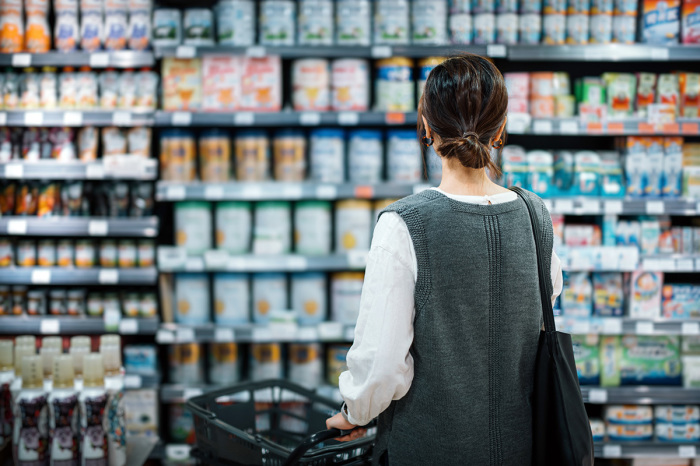Texas congresswoman launches website to help parents find baby formula amid shortage

A Republican congresswoman has created a website to help parents find baby formula amid a nationwide shortage as some political leaders blame the Biden administration for failing to address the scarcity. The president and his administration have countered such claims, saying they've moved quickly to address the problem.
U.S. Rep. Beth Van Duyne, R-Texas, announced the launch of DFW Baby Formula on Friday. The website allows Dallas-area residents to sign up to post the addresses of stores that have formula and which brands they have in stock. People can also fill out a form to provide information about stores that are out of formula to help update the map.
Duyne said she launched the website due to the shortage and what she described as the Biden administration's lack of a proper response, claiming that the president is "complacent with hungry children and desperate parents."
"I am committed to doing the work he continually fails to accomplish. Infants across North Texas are hungry today, and I am focused on using all the available resources to ensure their bottles are full," Van Duyne wrote in a Friday statement announcing the website's launch.
Duyne isn't the only Republican politician to criticize the Biden administration for perceived shortcomings regarding its handling of the formula shortage. During an interview with Fox News opinion host Sean Hannity for a segment on "Hannity" Thursday, Rep. Kat Cammack, R-Fla., also held the administration responsible for the shortage.
The congresswoman claimed that the Biden administration has "no plan, no contingencies, no way to backfill 43 percent of our nation's supply of baby formula."
According to Datasembly, out-of-stock (OOS) fluctuation for baby formula in 2021 was between 2% to 8% before hitting 30% in April 2022 and jumping to 40% by the month's end. The nationwide OOS percentage reached 43% for the week ending May 8.
Cammack said that she had received word from Border Patrol agents about tractor trailers full of pallets of baby formula sitting in a storeroom. Cammack made similar claims in a Wednesday tweet comparing a photo of stocked shelves of baby formula at a Customs and Border Protection detention facility in Texas to empty shelves in a grocery store.
"This is exactly what 'America last' looks like," the Florida Republican said during the "Hannity" segment. "You've got parents panicking, kids getting sick, and the humanitarian mission at the border. The agents are doing the best job that they can, but, man, their hands are tied."
In a joint statement on Thursday, Texas Gov. Greg Abbott and National Border Patrol Council President Brandon Judd said the Biden administration sending baby formula to the border is one of its "out-of-touch priorities."
However, Allen Orr, president of the American Immigration Lawyers Association, said in a statement to Politifact that detention facilities stockpiling supplies is not abnormal. "The formula is there because it has always been there," he said. The 1997 Flores Settlement requires border officials to provide adequate food and water to children detained at the border. A 2015 U.S. Customs and Border Protection document also states that food in detentions must be "appropriate for at-risk detainees' age and capabilities (such as formula and baby food)."
The White House and CPB did not immediately respond to The Christian Post's request for comment. However, the Biden administration stated that it's working to ensure infant formula is "safe and available" for families across the country. The administration added that it's taking several steps to address the shortage, including having the president speak with retailers and manufacturers to discuss ways to help families access formula.
Biden said it "will be a matter of weeks or less" to start fully refilling shelves.
One plan to increase access to formula includes making it easier for low-income families to purchase it through the Women, Infants and Children (WIC) program administered by USDA. Another includes having state attorneys and the Federal Trade Commission investigate "unfair market practices," such as individuals buying up formula at stores and selling it for an increased price online.
In addition, the U.S. Food and Drug Administration said it would take steps to increase the import of infant formula from abroad by lifting bans on formula imports from the U.K., Europe and Canada.
"We believe these and other ongoing efforts will help dramatically improve the supply in the US in a matter of weeks," FDA head Robert Califf said Friday on Twitter.
On Wednesday, the FDA said in a statement that it's taking steps such as expediating necessary certificates to allow flexible movement of products already available in the U.S. The FDA also said it would not object to Abbott Nutrition releasing certain life-sustaining supplies and metabolic formulas on a case-by-case basis.
The agency warned consumers on Feb. 17 against using certain powdered infant formula products from Abbott Nutrition's Sturgis, Michigan facility, and Abbott also issued a voluntary recall.
Before the recall, the FDA said it had already working to address supply-chain issues related to the COVID-19 pandemic. The FDA indicated it would "dedicate" all available resources to resolving the formula shortage and keeping the public informed about the ongoing situation.
One celebrity who has received public backlash for her comment on the shortage was Bette Midler, who was criticized for suggesting that mothers struggling to find formula "TRY BREASTFEEDING! It's free and available on demand," the New York Post reported.
According to Very Well Family, some mothers cannot breastfeed due to low breast milk supply, taking medications that are incompatible with breastfeeding, or other medical conditions.




























